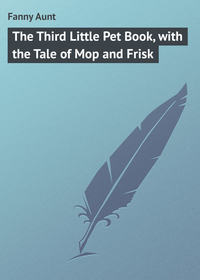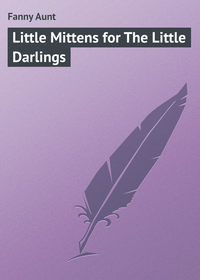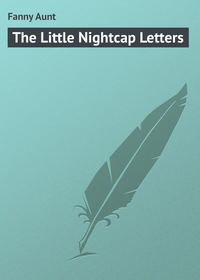
Aunt Fanny's Story-Book for Little Boys and Girls
The next morning, Susan, the old nurse, knocked very early at the door of the room where Henry slept. "Master Henry," said she, "what do you think happened last night?"
"What did?" said Henry, sitting up in the bed; "is my Mother better?"
"Yes, she is better," replied Susan, "but do guess what has come. Something that you have wished for very often. Something you can play with, and take care of, and love more than you love your dog Hector."
"Is it alive?" said Henry.
"Yes," replied Susan, "it is alive, and in your mother's room."
"Can it be a brother, a real live brother?" cried Henry, jumping out of bed, and running up to Susan.
"Yes, it is a brother, a real live brother," said Susan, laughing.
"I've got a brother, I've got a brother, a real brother!" shouted Henry, running up and down the room, clapping his hands, jumping over the chairs, and making a terrible noise, for in his joy he hardly knew what he was about.
"Oh hush, Master Henry!" said Susan. "What a crazy little fellow! Your Mother is still very ill. Now dress yourself quickly and quietly, and you shall see your little brother."
Henry trembled with joy, and in his haste he put his feet into the arms of his jacket, and his arms into the legs of his trousers; but after a while he managed to get them on right, and though he washed his face and hands in a minute, and brushed his hair with the back of the brush, yet he did not look so bad as you might suppose.
He went very softly into his Mother's room. It was darkened, and he could not see very well. He went up to the side of the bed. His Mother smiled and said, "Come here, my son." Her face was pale, but it had a very happy look, for in her arms, sweetly sleeping, was the little brother that Henry had longed for. He had a sister, who was nearly his own age, but he had always wished for a brother, and the brother had come at last.
"Dear Mother, may I help you take care of my little brother?" said Henry; "you know I am strong enough to hold him. I would not let him fall for the world."
"Yes, dear boy," replied his Mother, "when he is a little older, I shall have a great deal of comfort in trusting this dear little brother with you. It is more necessary now than ever, my son, that you should try always to be good, and to set a good example before your brother. He will be sure to do just as you do. If you are a good boy, you will be a good man; and how happy you will be, when you are grown up, to think that your good example will have made your brother a good boy, and a good man too. Now kiss me, and go get your breakfast."
Henry kissed his Mother, and told her of his good conduct in school, at which she was very glad, and then stooping down, he kissed the soft cheek of the little sleeping baby, and went gently out of the room.
In a few weeks, his Mother got quite well, and Charles (that was the baby's name) began to laugh and play with his brother. Henry was never so happy as when he was with Charles. He always put him to sleep at night. The dear little fellow would clasp his little hand tight round one of Henry's fingers, and fall to sleep in his bed, while his brother sang to him.
One day when Charles was about four years old, he said, "Dear brother, will you ride me on your back?" Henry was very busy just then; he was making a bow and arrow. He looked down, and saw a sweet little face, and two bright blue eyes, looking at him, and saying as plainly as eyes could say, "Do, dear brother." So he said, "Yes, Charley, I will, if you will help me to put away my things." Charles ran about, and helped Henry put his play-room in nice order, and then climbing on his back, and holding fast to a ribbon, for a bridle, which Henry held between his teeth, he gave him a little tap on the shoulder, and crying "Get up, old fellow," away they went around the room, Henry galloping so hard, that Charles bounced about almost as much as if he was on a real pony.
"Let us go in the parlors, they are a great deal larger," said Charles; "do, dear brother."
"I am afraid it would not be right," replied Henry; "we may break something. Mother has said that we had better never play there."
"But we will be so careful," said the little boy; "we can play circus so nice. I want to go in the parlor."
Henry's Father and Mother had gone out riding, so he could not ask leave to play in the parlors. He was almost sure it was wrong to go there, but he wanted to gratify his brother; so promising himself to be very careful, he trotted down stairs into the parlor, with Charles on his back. At first he went slowly round the two rooms, but Charles began to whip his horse and cry, "Get up, old boy, you are getting lazy. You shall be a race-horse – you shall be Boston. Now go faster, faster; go round the room like lightning."
So round he went, fast and faster, shaking his head, and taking great jumps, and kicking his legs up behind, with Charley holding on, laughing and screaming with delight, till alas! sad to tell, his elbow brushed against a beautiful and costly vase, which stood upon a little table, knocked it off, and broke it into a hundred pieces.
Henry stopped short, and let Charles slide down from his back. He looked at the broken vase, and then at his brother, and Charles looked at Henry, and then at the pieces on the floor.
"It is all broken," said he. "It can't be mended at all, can it, brother?"
"No, it is past mending," said Henry; "and the first thing we must do will be to tell Mother."
"Oh no!" said the little boy, "I am afraid to tell her."
"We must never be afraid to tell the truth, dear Charley. I will set you a good example. You shall never learn to tell a lie from me." Henry had always remembered what his Mother had said to him, the very first time he ever saw his little brother; and very often, when he was tempted to be naughty, or get in a passion, the words "Your brother will do just as you do," would seem to come from his heart, and he would conquer his passion.
In a few moments the boys heard the wheels of the carriage. Henry went to the hall door, and opened it. He held Charles by the hand. He had to hold him pretty tight, for Charles tried to get away. His face was pale. He waited until his Mother got out of the carriage and came up the steps – and taking hold of her hand and looking up in her face, he said in a firm voice, "Mother, I have broken your vase."
"And I too," said the little boy, "and it is broken all to pieces."
Henry was glad to hear his little brother say this, and oh! how happy it made him feel, to think that he had learned to speak the truth from him.
Their Mother kissed them both and said, "My darling boys, I am rejoiced that you are not afraid to speak the truth. I would rather lose twenty vases than have you tell a lie; but you knew it was wrong to play in the parlors, did you not?"
"Yes, dear Mother, it was wrong, and I knew it was," replied Henry. "I will submit to any punishment you think right. I ought to have remembered that you advised us not to go there."
"If you think you ought to be punished," said his Mother, "Charley shall go to bed to-night without your singing to him. This will make you both remember. Is that right?"
"Yes, dear Mother," said Henry; but he looked very sorry; and little Charles made up a long face, for he loved his brother so much, that he could not bear to think that he must go to sleep without holding his finger and hearing him sing.
When bed-time came, Charley wanted to beg his Mother to think of some other punishment for him. He wanted his dear brother so much. He looked at Henry, but Henry said, "Good-night, little fellow. We deserve this. Come! – one night will soon be over. Now, let us see how well you can behave;" and he gave him a smile, and a kiss so full of love, that the little fellow put his lips tight together, and marched off to bed without a tear. It was pretty hard to do it, but he had this kind brother to set him a good example, and he was determined to be as good a boy as Henry.
Not many weeks after this, poor little Charles was taken sick. He was very sick indeed, and every day he grew worse. The doctor did all he could for him, and Henry staid with him night and day, and would hardly take any rest. He gave him all his medicine, and sang to him very often when he was in pain. But Charles did not get any better, and at last, the doctor said that he could not make him well – the little boy must die.
When Henry heard this, the tears burst from his eyes, and he sobbed out, "Oh my brother! Oh my brother! I cannot part with you, my little precious brother."
The poor little fellow had become so weak and thin that he could scarcely lift his hands from the bed where he lay.
The last night came. He knew that he would not live many hours, for his dear Mother had told him so; and now she told him, that as he had always tried to be a good boy, he would go to Heaven, and Jesus would take him into his bosom, and love him, and keep him, until they came to him.
His little pale face grew bright. "Dear Mother," said he, "will Jesus let my brother come to me? I want my brother in Heaven. Come here close to me," said he to Henry. His brother leaned his face down close to the little boy's face, and helped him clasp his arms around his neck, and then he whispered, in a soft weak voice, "Do not cry, dear brother, do not cry any more. I will pray to Jesus, to let you come very soon and sing me to sleep in Heaven."
These were the last words he spoke, for his breath grew shorter and shorter, and soon after his little hand dropped away from his brother's, and he was dead.
His Father had him buried in Greenwood Cemetery.
It was in the summer time that he died, and his brother Henry planted a white rose-bush at the foot of the little grave, and a red rose-bush at the head, and often in the pleasant summer afternoons he would go alone to Greenwood, and sit upon little Charley's grave, and think how he might now be praying for him in Heaven.
Henry is now a man. He was always a good boy. He is now a good man; and although many years have passed since he lost his little brother, he goes every summer to Greenwood to visit his grave; and the tears always come into his eyes when he speaks of him, and tells that little Charley's last words were, that he would pray to Jesus to let his darling brother come soon, and sing him to sleep in Heaven.
ANNIE BROWNE
Little Annie Browne was an only child, that is, her parents had no little boys at all, and only this one little girl; so you may be sure they loved this little girl very much indeed, and were all the time doing every thing to make her happy. Now I wonder if the dear little boy, or girl, who is reading this, can guess the means that Annie's Father and Mother took to make her happy.
Did they give her plenty of candy? No. Did they buy new play things for her every day? No. Did they take her very often to the Museum, or the Circus, or the Menagerie? No. This was not the way. I will tell you what they did; and I will tell you what Annie did, for one whole day, when she was about five years old, and that will give you a very good idea of the way they took to make her good, for then she was sure to be happy.
Well, one day Annie woke up very early in the morning, and, sitting up in her little bed, which was close by the side of her Mamma's, she first rubbed her eyes, and than she looked all round the room, and saw a narrow streak of bright light on the wall. It was made by the sun shining through a crack in the shutter. She began to sing softly this little song, that she had learned in school —
"What is it shines so very bright,That quick dispels the dusky night?It is the sun, the sun,Shedding around its cheerful light —It is the sun, the sun."Presently she looked round again, and saw her Mamma sleeping. She said in her soft little voice – "Mamma, Mamma, good morning, dear Mamma."
But her Mamma did not wake up. Then she crept over her to where her Papa was sleeping, and said —
"Papa, Papa, good morning, dear Papa."
But her Papa was too fast asleep to hear her. So she gave her Papa a little kiss on the end of his nose, and laid gently down between them.
In a few minutes, her Papa woke up, and said —
"Why! what little monkey is this in the bed?" which made Annie laugh very much. She then jumped out of bed, and put on her stockings and shoes herself, as all little boys and girls of five years old ought, and put on her clothes; and her Mamma, who was now awake, fastened them, and brushed her hair nicely, and washed her face and hands. After that, she said some little prayers, that her Mamma had taught her – and then ran down stairs, singing as gay as a lark, and dancing as light as a fairy.
After breakfast, her Mamma got her school basket, (it was a cunning little basket,) and put in it a nice slice of bread and butter, and a peach, and gave her a little bouquet of flowers to present to her teacher, whom little Annie loved dearly; and then her Mamma said, "Good bye, my darling," and Annie made her such a funny little curtsey, that she nearly tumbled over, and off she went to school with her Papa, who always saw her safe to the door.
Annie staid in school from nine o'clock until two. When she came home, her Mother kissed her, and said —
"Have you been a good little girl in school to-day?"
"I think I have," said Annie; "Miss Harriet said that I was very diligent. What is diligent, Mamma?"
"To be diligent, my dear," answered her Mamma, "means to study your lesson all the time, without thinking of play, or any thing else, until you know it perfectly."
Annie said she was glad it meant such good things, and added, "Mamma, will you play I am a lady, coming to see you, if you are not too busy?"
Her Mamma said she would. So Annie got her two dollys. One was a very pretty wax doll, with eyes that could open and shut. Her name was Emily; and the other was not wax, but was larger. Her name was Augusta. She put on their hats and visites, and dressed herself in an old hat, with a green veil, and came near her Mamma, and made believe ring a bell, and said, "Ting a ling, ting a ling."
"Come in," said her Mamma.
Little Annie shook hands with her Mamma, and said, "How do you do, Mrs. Browne?"
"Thank you, I am very well," said her Mamma. "Take a seat, my dear Mrs. Frisby," that was Annie's name. "How are your children, Mrs. Frisby?"
"Oh! they are very sick," answered Annie; "one has the toothache, and the other has a little square hole in the back of her head, and it has made her head ache."
"Dear me, Mrs. Frisby," said her Mamma, "I am very sorry to hear it; you ought to go to the doctor with them."
Then Annie pretended to go to the doctor, and she took out of the drawer a little bit of sugar for medicine. She eat the medicine up herself, and said that it had done the dollys a great deal of good. In this pleasant way she amused herself until dinner time.
After dinner, her Papa and Mamma took her to Union Park, as it was pleasant; and there Annie jumped the rope with other little girls, or rolled a great hoop. She could roll the hoop very well.
Then she came skipping home, and had her tea; and after that her Mother undressed her and heard her say her prayers, and kissed her for good night; and she jumped into bed, and in a moment was fast asleep. Don't you think Annie was a happy little girl? I think she was, for all her days passed in this pleasant manner. Some other time, perhaps, I will tell you more about little Annie Browne.
THE THREE BEARS
Laura and Fanny came one Saturday to spend the day with their Grandmamma. The moment they got into the house, little Laura ran to the book-case, to get a book to read; and Fanny asked for a needle and thread, and began to sew up a corner of the red cloth that was on the work-table.
Both these little girls were very fond of coming to see their Grandmamma, and she liked to have them come; for they gave her no trouble, and were very good and polite to every body.
Pretty soon Laura said, "Oh, dear! this is not a very interesting book, I am tired of reading it. I wonder where Aunt Fanny is. I believe I will go find her, and get her to tell me a story."
"A story!" said Fanny, "then I will go too." So she stuck her needle in her work, and they both ran out of the room.
They found their Aunt Fanny in the next room. She was sitting at her writing-desk, writing a letter.
"Oh, Auntie!" said Laura, coming up to the desk, "how much you have written; I am sure you must be tired. Suppose you stop a little while, and rest yourself by telling us a story."
Her Aunt laughed, and said that was a very clever way of getting a story out of her, and asked the children what kind of a story they would like.
"I like a fairy tale," said little Fanny.
"And I like a ghost story," said Laura. "I think a ghost story is great fun, for I never believe a word of it."
"But you know I never tell ghost stories," replied her Aunt; "they are very silly things. I will tell you a story about three bears, which I read a long while ago. I do not remember it exactly, but I think I can make it do for you."
"Oh, yes! yes!" cried the children, "three bears! – that will be funny I know."
So their kind Aunt laid down her pen, and took little Fanny upon her lap, and told Laura to get a bench and sit by her side, and commenced her story.1
"Once upon a time there were three bears, that lived in a thick wood. One was a GREAT BIG BEAR, one a middling sized bear, and the third a tiny bit of a bear. The GREAT BIG BEAR lived in a GREAT BIG HOUSE; the middling sized bear lived in a middling sized house; and the tiny bit of a bear lived in a little speck of a house; and the houses were close together.
"Well, one day the bears went off to take a walk; and, while they were gone, a little ragged dirty old woman came through the wood. All at once, she spied the three houses; so she hobbled up to see who lived in them. First she went into the great big bear's house, and there she saw a great big bowl of porridge on the table. She tasted it. It was a great deal too hot. Then she came out of the house, and went into the middling sized bear's house, and there she saw a middling sized bowl of porridge. So she tasted it, and found it was a little to hot. She came out, and went into the tiny bit of a bear's house, and there she saw a little mite of a bowl of porridge. She tasted it, and it was just right, so the little ragged dirty old woman eat it all up. Then she went up stairs and laid down on the tiny bit of a bear's bed, and was very soon fast asleep.
"By and by, the bears came home. The great big bear went into his house, and looked on the table. Then he said, in a tremendous voice —
"'Somebody has been at my bowl of porridge.'
"The middling sized bear went into his house, and, looking on the table, he said in a middling sized voice —
"'Somebody has been at my bowl of porridge.'
"Then the tiny bit of a bear went into his house, and, looking on the table, he said, in a little squeaking voice —
"'Somebody has been at my bowl of porridge, and eat it all up.'
"Oh, how angry he was. He went to the door, and called the other bears, and they all three went up stairs together, to search for the thief; and there they found the thief, in the shape of the little ragged dirty old woman that was fast asleep, and snoring like a trumpeter, on the bed. The great big bear went and stood at the head of the bed; the middling sized bear went and stood at the middle of the bed; and the tiny bit of a bear went and stood at the foot of the bed. Then the great big bear said —
"'Who is this in the bed?'
"The middling sized bear said —
"'It looks like a dirty old woman.'
"'And there's some of my porridge sticking on her lips,' said the tiny bit of a bear. As he said this, the old woman awoke, and opened her eyes.
"When she saw the bears, she was frightened almost out of her wits; so she started up, and jumped right out of the window, that was close to the bed, and ran off with all her might and main. Then the bears tumbled down stairs head over heels, pell-mell, and rushed out of the house, to catch her and eat her up; but they were so fat, they could not run as fast as she could; so the little ragged dirty old woman got off, all out of breath, but safe and sound."
"What did the tiny bit of a bear do for his dinner?" asked Fanny.
"He had to suck his paws, I suppose," answered her Aunt; "but I do not know, for that was the end of the story."
The children had laughed very much at this story, because their Aunt had told it to them in a way that made it very amusing. They thanked her, and said they hoped she would tell it to them again, the next Saturday. She promised she would, and told them to run off, as she wanted to finish her letter. So the little girls went off, and spent the rest of the day in various ways, taking care not to be troublesome or noisy; and when they went home, they told their Mother, as well as they could, the funny story of the three bears.
ABOUT MINDING QUICKLY
Emma was one day sitting by the fire, on a little bench. She was trying to cut a mouse out of a piece of paper. She had a pair of scissors, with round ends. Her Mother had given her these scissors for her own, because they were safer for her to use than scissors with pointed ends.
Presently her Mother said, "Come here to me, Emma."
"Wait a minute, Mother," said Emma.
"Do you know," said her Mother, "that it was naughty for you to say that?"
"Why, you can wait a little minute," said Emma; "I am very busy. Don't you see that I am making a mouse?"
"Emma," replied her Mother, "do you know that I ought to punish you, because you do not mind?"
"I am coming right away," cried Emma, dropping her scissors and her paper mouse, and running up to her Mother.
Her Mother took her up on her lap, and said, "My little girl, this will never do. You must learn to come at once when you are called; you must obey quickly. If you continue in this very naughty habit of not minding until you are told to do a thing two or three times, you will grow up a very disagreeable girl, and nobody will love you."
Emma looked up mournfully into her Mother's face, and said, "Mother, I will try to do better."
She was a good-tempered child, and was seldom cross or sullen; but she had this one bad habit, and it was a very bad habit indeed – she waited to be told twice, and sometimes oftener, and many times she made her kind Mother very unhappy.
For a few days after this Emma remembered what her Mother had said to her, and always came the first time she was called. She came pleasantly, for it is very important to mind pleasantly, and did every thing she was told to do right away, and her Mother loved her dearly, and hoped she was quite cured of her naughty ways.
But I am very sorry to have to say that a time came when Emma entirely forgot her promise. You shall hear how it happened.
One morning Emma's Mother said to her, "Emma, it is time for you to get up, and put on your stockings and shoes."
Emma did not move. She lay with her eyes wide open, watching a fly on the wall, that was scrubbing his thin wings with his hind legs.
"Did you hear me, Emma? Put on your stockings and shoes."
Emma got up very slowly. She put one foot out of bed, and then looked again at the fly. This time he was scrubbing his face with his fore legs. So she sat there, and said to herself, "I wonder how that funny little fly can stay upon the wall. I can't walk up the wall as the fly can. What a little round black head he has got."
"Emma!" said her Mother, and this time she spoke in a very severe tone.
Emma started, and put her other foot out of bed, and took up one of her stockings.
Her Mother got out of her bed, which was close to Emma's crib, and began to dress herself. When she was dressed, she looked round, and saw Emma, with one stocking half on, and the other rolled up in a little ball, which she was throwing up in the air.
Her Mother was angry with her. She went up to her, and took her stocking away from her, and told her to get into bed again, for if she would not dress herself when her Mother bid her, she should be punished by being made to lie in bed. She shut up the window shutters, and took all the books out of the room, and telling Emma not to get up until she gave her leave, she went down stairs to breakfast.









